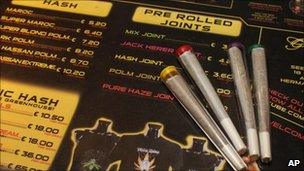Dutch to reclassify high-strength cannabis
- Published

Much of the higher-strength cannabis will have to be removed from sale in coffee shops
The famous cannabis-selling coffee shops of the Netherlands are facing new tighter restrictions.
The Dutch government is reclassifying high-strength cannabis to put it in the same category as hard drugs.
It says the amount of the main active chemical in the drug, THC, has gone up, making it far more potent than a generation ago.
It means the coffee shops will be forced to take the popular, high-strength varieties off their shelves.
Dutch politicians say high-strength cannabis, known as "skunk", is more dangerous than it was before.
In the future, anything containing more than 15% THC will be treated the same way as hard drugs, such as cocaine and ecstasy.
The move is a big blow to the coffee shops - and means they will have to replace about 80% of their stock with weaker varieties.
Marc Josemans, who runs a cafe in Maastricht, says he believes that the new tough approach is being driven by the increasingly influential far-right in Dutch politics.
"You immediately can taste the difference. Everything which is considered unusual for them - they call it 'left hobbies' and under this name they want to ban all 'left hobbies', like using cannabis," he told the BBC.
The move means that the Netherlands' traditional tolerance of soft drugs is to become a thing of the past.
The ban on the high-strength "skunk" is expected to be introduced next year, when police will start doing random checks in the cafes.
From next year, the Dutch government also plans to ban tourists from entering coffee shops across the country.
Amsterdam and other cities are strongly opposed to such a ban.